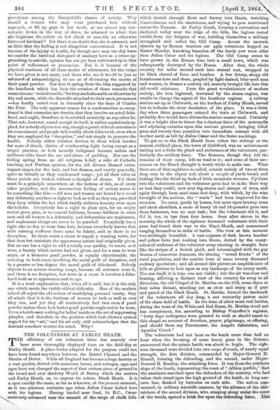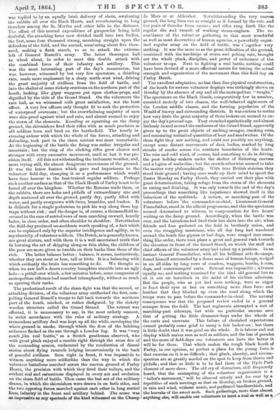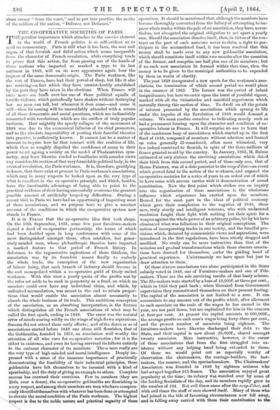THE VOLUNTEERS AT FARLEY HEATH.
THE efficiency of our volunteer force has scarcely ever 1. been more thoroughly displayed than on the field-day at Farley Heath. A place better adapted for the purpose could not have been found anywhere between the Bristol Channel and the Straits of Dover. While all England has become a huge factory or a vast garden, dotted with mansions, farms, and cottages, ages and ages have not changed the aspect of that curious piece of ground in the broad and ever shadowy Weald of Surrey which the natives call Farley Heath, or, to express its colour, Black Heath. It is a spot exactly the same, as far as is known, at the present moment, as it was nineteen centuries ago when Julius Cmsar halted here with his legions. Having landed near Deal, 54 B.C., Caesar cautiously advanced near the summit of the range of chalk hills which stretch through Kent and Surrey into Hants, watching Cassivelaunus and his charioteers, and trying to pass northward across the Tamesis. At Farley Heath, forming a convenient and sheltered valley near the ridge of the hills, the legions rested awhile from the fatigues of war, building themselves a military stronghold still called the Old Camp. Across the mounds thrown up by Roman warriors our agile volunteers hopped on Easter Monday, knocking branches off the hardy yew trees older than Julius Caesar and his legions. The Old Camp seems to have grown in the Roman time into a small town, which was subsequently destroyed by the Danes. After that, the whole country for miles around sank into eternal rest, wrapped in Its black shroud of furze and heather. A few littery, sleepy old farmhouses here and there, peopled by light-haired, blue-eyed men and women, in dresses a century old, scarcely brought life into this old-world existence. Even the great revolutionizer of modern society, the iron highroad, traversed by the steam engine, was unable to change the aspect of the heathery regions. A railway station set up at Chilworth, on the borders of Farley Heath, served but to indicate the utter desolation of the place. It was a brisk day when three passengers entered the train at Chilworth, and probably five would have driven the station-master mad. Certainly it was a bright idea to throw the volunteer force of the metropolis and adjoining counties upon this ancient ground, bringing rifled guns and twenty-four pounders into immediate contact with old mother earth as left by Julius Claw and the Norse sea kings.
To get on to the Black Heath from either the railway or the nearest civilized place, the town of Guildford, was an achievement tasking not a little the pluck and endurance of the volunteers, par- ticularly the artillery force.. The Romans, though they left the remains of their camp, left no road to it ; and none of their suc- cessors on the Heath thought it worth while to make one. What there are of thoroughfares so-called, consist mainly of two or three deep ruts in the clayey soil, about a couple of yards broad, and looking like the dried-up beds of little mountain streams. Up these ruts the volunteers and the volunteer guns had to make their way as beat they could ; now over big stones and stumps of trees, and again through loose sand some feet deep, with which, by the wise foresight of the natives, the " roads " had been improved for the occasion. To carry, partly by horses, but more upon brawny arms and stout shoulders, a score of heavy 18 and 24-pounder guns into these fastnesses, was no easy task; but the volunteers did it, and did it, too, in less than four hours. Soon after eleven in the morning the whole of the eighteen thousand volunteers with their guns had found their way to the Black Heath, and commenced ranging themselves in order of battle. The view at this moment was strikingly beautiful. A vast expanse of dark brown heather and yellow furze just rushing into bloom, dotted by the many- coloured uniforms of the volunteer army running in. straight lines like the stripes of a Scotch plaid, and intermingled with the gay dresses of numerous Amazons, the shining "round frocks" of the rural population, and the sombre hues of some twenty thousand cockney spectators; and all around this picture an amphitheatre of hills as glorious to look upon as any landscape of the sunny south. The sun itself, it is true, was not visible; but the air was clear and bracing, allowing a distinct view of the country far away in all directions, the old Chapel of St. Martha-on-the-Hill, some three or four miles distant, standing out as clear and sharp as if part and parcel of the Black Heath. St. Martha formed the landmark of the volunteers all, day long, a not unworthy patron saint of the sham field of battle. In the time of other more real battles, during the wars of the White and Red Roses, St. Martha stood not less conspicuous, for, according to Bishop Waynflete's register, "forty days' indulgence were granted to such as should resort to this chapel on account of devotion, prayer, pilgrimage, or offering, and should there say Paternoster, the Angel's Salutation, and Apostles' Creed."
The volunteers had not been on the heath more than half an hour when the booming of some heavy guns in the distance announced that the mimic battle was about to begin. The eigh- teen thousand were divided into two corps crornde, of nearly equal strength, the first division, commanded by Major-General D. Russell, forming the defending, and the second, under Major- General R. Rumley, the attacking force. It was from the southern slope of the heath, representing the coast of "Albion perfide," that the assailants marched upon the defenders of the country, who had taken their stand upon the high ground of the heath, in long con- cave line, flanked by batteries on each side. The action com-
menced, in military scientific manner, by the advance of the skir- mishers of the second division, who, creeping along under the cover of the woods, opened a brisk fire upon the defending force. This
was replied to by an equally brisk delivery of shots, awakening the rabbits all over the Black Heath, sad reverberating in long thunders among the St. Martha and other hills in the distance. The effect of this mutual expenditure of gunpowder being held doubtful, the attacking force now divided itself iuto two bodies, the first, some four thousand strong, marching straight upon the defenders of the field, and the second, numbering about five thou- sand, making a flank march, so as to attack the extreme left of General Russell's army. The latter thereupon had
to wheel about, in order to meet this double attack with the combined force of their infantry and artillery. This was the most interesting part of the day's manceuvres, but was, however, witnessed by but very few spectators, a drizzling rain, made more unpleasant by a sharp north-west wind, driving the great majority of civilians from the field of battle, and into the shelter of some rickety erections on the northern part of the heath, looking like gipsy waggons put upon clothes-props, and dignified by the title of the Grand Stand. On the volunteers the rain had, as we witnessed with great satisfaction, not the least effect. A very few officers only thought fit to seek the protection of waterproof overcoats ; but the overwhelming majority of men were skin-proof against wind and rain, and almost seemed to enjoy the storm of the elements. Kneeling or squatting on the damp _ground, the skirmishers fired their rifles with as much precision as old soldiers born and bred on the battle-field. The hourly in- creasing ardour with which the whole of the forces, attacking and defending, took part in the sham contest was most remarkable. At the beginning of the battle the firing was rather irregular and uncertain ; but the ring of the clicking rifles grew clearer and stronger with every successive movement, until at last it was pre- eision itself. All this notwithstanding the inclement weather, and, more trying still, the almost dangerous unevenness of the ground. It was the latter feature which gave real importance to the volunteer field-day, stamping it as a performance which would have done honour to the best-trained regular soldiers. Perhaps such another surface as that of the Black Heath of Farley is not to be found all over the kingdom. Whether the Romans made them, or the rabbits, there are holes and pitfalls of extraordinary size and depth scattered all over the ground, partly dry, partly filled with water, and partly overgrown with furze, brambles, and bushes. It is difficult for a single pedestrian to pick his way along these leg- traps without risk ; and the danger is, of course, a thousandfold in- creased in the case of serried rows of men marching onward, heavily laden, in close order, and often shoulder to shoulder. Nevertheless the field-day produced no accidents worth speaking of, a fact which can be explained only by the superior intelligence and agility, so to say elasticity, of volunteer soldiers. The Dutch, as is generally known, -are great skaters, and with them it is a well ascertained truth that in learning the art of skipping along on thin slides, the children of -the poor are more given to tumble on their backs than those of the rich. The latter balance better ; balance, it seems, instinctively, whether they are stout or lean, tall or little. It is a balancing with which evidently the brain has something to do. We thought so when we saw half a dozen country bumpkins stumble into an ugly hole —a pitfall over which, a few minutes before, some companies of metropolitan riflemen had marched triumphantly, without so much .as opening their ranks.
The predestined result of the sham-fight was that the second, or attacking division, of the volunteer army outflanked the first, com- pelling General Russell's troops to fall back towards the northern part of the heath, misrked, or rather disfigured, by the rickety wooden structure called the Grand Strand. The retreat was effected, it is unnecessary to say, in the most orderly manner, in strict accordance with the rules of military strategy. A -tremendous artillery duel was kept up all the while, enveloping the whole ground in smoke, through which the fires of the belching ordnance flashed as the sun through a London fog. It was "very much Jike real battle," as a Scotch gentleman observed, who with great pluck enjoyed a ramble right through the cross fire of the contending armies, undaunted by the recollection of dismal stories about flying ramrods lodging inconveniently in the back of peaceful civilians Seen right in front, it was impossible to witness anything more soldierlike than the way in which the volunteer battalions marched across the uneven ground of Farley Heath, the precision with which they fired their volleys, and the evident zeal and earnestness displayed in every act and evolution on the sham field of battle. Then came the last act of the military drama, in which the skirmishers were drawn in on both sides, and the two opposing forces marched against each other in long serried lines, infantry in the front and artillery behind. The scene was as impressive as any spectacle of the kind witnessed on the Champ
de Mars or at Aldershot. Notwithstanding the very unevea ground, the long lines ran as straight as if formed by the rule, and the peals of thunder from cannon and rifles rang forth like the regular din and tumult of working steam-engines. The re- semblance of the voluntoer gathering to that most wonderful as well as most destructive of human agencies, a powerfully organ- ized regular army on the field of battle, was 1:1-ogether very striking. It was the more so as the great difficulties of the ground, combined with the hardships of storm and pelting rain, brought out the whole pluck, discipline, and power of endurance of the volunteer troops. Next to fighting a real battle, nothing could have been devised of a more effectual nature for testing the actual strength and organization of the movement than this field day on Farley Heath.
The excellent adaptation, no lees than fine physical conformation, of the heath for serious volunteer displays was strikingly shown on Monday by the absence of any and all the metropolitan "roughs." The spectators on the Black Heath, comparatively few in number, consisted entirely of two classes, the well-behaved sight-seers of the London middle classes, and the farming population of the Wealdof Surrey and surrounding districts. It was curious to notice how very-little the great majority of these lookers-on seemed to en- joy the day's proceedings. They crouched apathetically and almost listlessly in and around the enclosure of the Grand Stand, apparently given up to the great objects of sucking oranges, cracking nuts, and consuming unlimited quantities of beer and sandwiches. Of the sham fight they saw nothing, and could not possibly see anything, except some distant movements of dark bodies, marked by long streaks of smoke across the southern boundaries of the heath. The rain and cold wind, of course, had something to do in driving the poor holiday-makers under the shelter of fluttering canvass and a legion of umbrellas ; but the crowds otherwise seemed to take the matter very philosophically. With true British stoicism they stood their ground ; having once made up their mind to spend the Easter Monday on Farley Heath, they carried out their plan with great determination, taking refuge from the storm of the elements in eating and drinking. It was only towards the end of the day's proceedings that something like impatience showed itself in the behaviour of the multitude. A review, or marching-past of the volunteers before the commander-in-chief, Lieutenant-General Pennefather, stood in the official programme, and this the spectators seemed determined to witness, in compensation for five hours' waiting on the damp ground. Accordingly, when the battle was over, and the battalions had fired their last shots into the air; when friends and foes gathered on the field in brotherly union, and even the straggling musicians, who all day long had wandered around the heath like gipsies or lost dogs, were ranged into some- thing like order, there took place a great and general rush towards the elevation in front of the Grand Stand, on which the staff and chief officers of the volunteer army had taken up a position. In an instant General Pennefather, with all his brilliant aide-de-camps, found himself surrounded by a dense mass of human beings, wedged in on all sides by long rows of coaches, waggons, booths, horses, dogs, and costermongers' carte. Retreat was impossible ; advance equally so; and nothing remained for the kind old general but to sit it out on horseback in the midst of his civilian admirers. But the people, who as yet had seen nothing, were so eager to feast their eyes at last on something more than furze and heather that they blocked up even the road along which the troops were to pass before the commander-in-chief. The natural consequence was that the proposed review ended in a general scamper from the field. The best regiments attempted a sort of marching-past sideways, but with no particular meters save that of getting the little drummer-boys under the wheels of the carts and caravans. This failure of cherished expectations caused probably some grief to many a fair looker-on ; but there is little doubt that it was good on the whole. It is labour and not display which makes men as well as soldiers, and the lees of parades and the more of field-days our volunteers can have the better it will be for them. That which makes the rough black heath of Farley, in our opinion, so perfect a place for the young force is that exercise on it is so difficult ; that pluck, alacrity, and circum- spection are so greatly needed on the spot to keep from thorns and
pitfalls; and that so little is to be had there of the Hyde Park element of mere show. The old cry of detractors, still frequently heard, that the mainspring of the volunteer organization is a "tailor's movement," will be silenced utterly and for ever by a repetition of such meetings as that on Monday, on broken ground,
in rain and wind, without music, and perfumed handkerchiefs, and the hurrahs of the sweet mob. Such gatherings, more than almost anything else, will enable our volunteers to meet a real as well as
sham enemy "from the coast," and to put into practice the motto of the soldiers of the nation, "Defence, not Defiance."




































 Previous page
Previous page